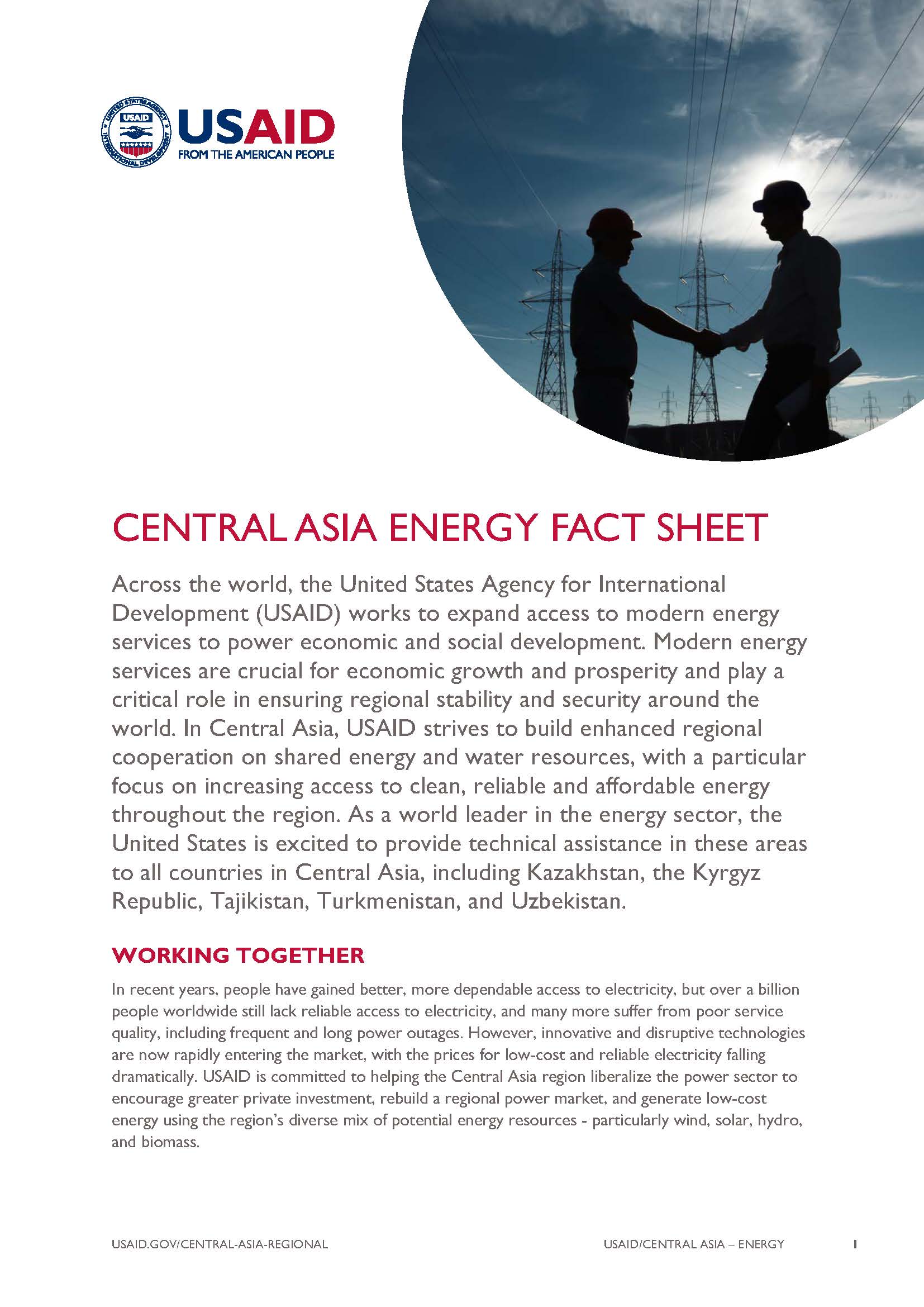Speeches Shim
Central Asia Energy Fact Sheet ![]() (pdf - 117k)
(pdf - 117k)
Across the world, the United States Agency for International Development (USAID) works to expand access to modern energy services to power economic and social development. Modern energy services are crucial for economic growth and prosperity and play a critical role in ensuring regional stability and security around the world. In Central Asia, USAID strives to build enhanced regional cooperation on shared energy and water resources, with a particular focus on increasing access to clean, reliable and affordable energy throughout the region. As a world leader in the energy sector, the United States is excited to provide technical assistance in these areas to all countries in Central Asia, including Kazakhstan, the Kyrgyz Republic, Tajikistan, Turkmenistan, and Uzbekistan.
WORKING TOGETHER
In recent years, people have gained better, more dependable access to electricity, but over a billion people worldwide still lack reliable access to electricity, and many more suffer from poor service quality, including frequent and long power outages. However, innovative and disruptive technologies are now rapidly entering the market, with the prices for low-cost and reliable electricity falling dramatically. USAID is committed to helping the Central Asia region liberalize the power sector to encourage greater private investment, rebuild a regional power market, and generate low-cost energy using the region’s diverse mix of potential energy resources - particularly wind, solar, hydro, and biomass.
By partnering with the countries of Central Asia, international donor agencies, and the private sector, USAID helps support a long-term, sustainable vision of the region’s energy sector. As the region pursues improvements to energy infrastructure and institutions, more robust integration of the region’s energy markets, and economic growth based on energy trading, USAID’s assistance is helping to realize this important vision. The U.S. will also bring the power of the American private sector to develop a cost-effective, reliable and least-cost electricity system.
In partnership with host country governments and donor agencies, USAID’s efforts will positively impact the regulatory and policy reforms to improve governance and utility performance. This will create an investment climate for U.S. project developers and investors, all of which will generate opportunities for American companies to export technologies and services that create more American jobs.
WHAT WE DO
C5+1 DIPLOMATIC PLATFORM
USAID provides assistance to adopt and scale up least cost energy solutions through the C5+1 diplomatic platform, which seeks to build engagement and dialogue for joint efforts to address common challenges faced by the five Central Asian countries. The C5+1 platform assists the countries in creating enabling environments for private sector investments in low-cost renewable energy and energy efficiency projects. USAID supports the countries in reforms that foster greater private investment using competitive forces to drive down the costs. With USAID’s assistance, competitive auctions have been introduced as an effective policy tool that is now being adopted in some of the Central Asian countries. USAID also provides assistance in policy reforms to modernize the power sector, including unbundling vertically integrated power sectors, and long-term planning for least-cost options for generation.
REGIONAL CONNECTIVITY
USAID works with each country to establish a regional power market that will provide for increased trading of electricity among the Central Asian countries and thereby offer the potential for lower electricity costs, improved energy security, and support greater economic growth. Central Asia can become a true regional power supplier, exporting surplus electricity to other countries in Central and South Asia – a potential revenue stream that could improve the financial health of electric utilities and contribute to power sector investment and maintenance. In helping to advance regional electricity connectivity, USAID plays a major role in advancing two regional projects: The Central Asia Regional Electricity Market, or CAREM, and the Central Asia-South Asia power project (CASA-1000). CAREM and CASA-1000 will support a regional power market that can deploy the lowest-cost power from across the Central and South Asian countries to meet the needs of each country, lowering costs in support of greater economic and social development. An integrated electricity market will save money, enhance energy security and economic stability, and facilitate commercial trade transactions and attract investments in the power sectors of all five Central Asian and neighboring South Asian countries. Applying market-based mechanisms that drive down the costs of grid-connected renewable energy and improving system operations and energy efficiency of existing generation facilities, can increase deployment and integration of regional wind and solar energy to improve cross-border cooperation. This approach can lead to new economic opportunities for rural and agricultural areas and increase energy security in countries that experience severe wintertime electricity shortages. There are great opportunities for U.S. businesses to take an active role in this work, providing cutting-edge technology and know-how to Central Asia.


Comment
Make a general inquiry or suggest an improvement.